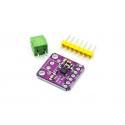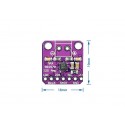Max98357 I2S Audio Amplifier Module Filterless Class D Amplifier Supports Esp32 Raspberry Pi
Rs. 155.00 Rs. 177.00
- Brand: https://www.maximintegrated.com/en/products/analog/audio/MAX9835
- Product Code: SEN-AUDIO-AMP
- Availability: In Stock
- Price in reward points: 3
- For Bulk Order
 9962060070
9962060070
SPECIFICATIONS:
-3.2 W output at 10% THD, 4 Ω impedance of the speaker and 5 V power supply
-2.7 - 5.5 V operating voltage
-77 dB PSRR at 1 kHz
-Selectable gains: 3 dB, 6 dB, 9 dB, 12 dB, 15 dB
OVERVIEW:
-Output Power: 3.2W at 4Ω, 10% THD, 1.8W at 8Ω, 10% THD, with 5V supply
-PSRR: 77 dB typ @ 1KHz
-I2S sample rates from 8kHz to 96kHz
-No MCLK required
-Click + Pop reduction
-Five pin-selectable gains: 3dB, 6dB, 9dB, 12dB, 15dB
-Excellent click-and-pop suppression
-Thermal shutdown protection
PACKAGE INCLUDES:
1 PCS x Max98357 I2S Audio Amplifier Module Filterless Class D Amplifier Supports Esp32 Raspberry Pi
https://www.maximintegrated.com/en/products/analog/audio/MAX98357A.html
//SOURCE CODE TAKEN FROM BELOW LINK
//https://learn.adafruit.com/adafruit-max98357-i2s-class-d-mono-amp/arduino-wiring-test-2
#include <Arduino.h>
#include <Adafruit_ZeroI2S.h>
#include <math.h>
/* max volume for 32 bit data */
#define VOLUME ( (1UL << 31) - 1)
/* create a buffer for both the left and right channel data */
#define BUFSIZE 128
int left[BUFSIZE];
int right[BUFSIZE];
// Use default pins in board variant
Adafruit_ZeroI2S i2s = Adafruit_ZeroI2S();
void setup()
{
while (!Serial) delay(10);
Serial.println("I2S demo");
for(int i=0; i<BUFSIZE; i++){
/* create a sine wave on the left channel */
left[i] = sin( (2*PI / (BUFSIZE) ) * i) * VOLUME;
/* create a cosine wave on the right channel */
right[i] = cos( (2*PI / (BUFSIZE) ) * i) * VOLUME;
}
/* begin I2S on the default pins. 24 bit depth at
* 44100 samples per second
*/
i2s.begin(I2S_32_BIT, 44100);
i2s.enableTx();
}
void loop()
{
/* write the output buffers
* note that i2s.write() will block until both channels are written.
*/
for(int i=0; i<BUFSIZE; i++){
i2s.write(left[i], right[i]);
}
}
15 days



